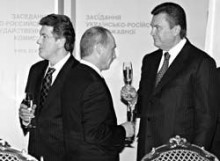Ukraine and Russia seem to be taking an increasingly constructive approach to tackling thorny problems. Both Kyiv and Moscow are showing interest in cooperation. This particularly concerns the joint efforts of Russia and Ukraine to provide energy security in Europe.
This spirit of constructiveness was palpable during last Friday’s meeting in Kyiv of the Yushchenko- Putin Commission set up almost two years ago. The two sides signed five cooperation agreements and seemed to take certain steps or at least announced an intention to address other, more acute, problems. Following his talks with Russian President Vladimir Putin, President Viktor Yushchenko of Ukraine said he is convinced that with goodwill both sides can find mutually-acceptable solutions to all outstanding problems.
Some signs of headway were the presidents’ discussions of such acute subjects as border settlement. According to the Ukrainian president, this should be one of the key issues of cooperation in 2007. Yushchenko announced that within two or three weeks the two countries will work out an action plan for 2007-08 and draw “a road map of basic measures to resolve complicated problems,” such as border delimitation and demarcation, and the Strait of Kerch.
Yushchenko also named another set of problems, namely, the stationing of the Russian Black Sea Fleet in Ukraine. This mostly concerns such topics as land, real estate, radio frequencies, and navigation. The presidents of Ukraine and Russia suggested that economic cooperation be viewed as a separate set of problems. In Yushchenko’s view, this entails cooperation in aviation, the fuel and energy complex, the humanitarian sphere, international cooperation, etc. The Ukrainian president favors drawing up a clear-cut plan of action, a “road map” of sorts, for 2007-2008, which will clearly define specific issues of cooperation.
On his part, President Putin called for more active cooperation between Russia and Ukraine’s regions. During the meeting Putin said that regional and cross-border ties have received an impetus in the last while. The point is to fully implement the programs of interregional and cross-border cooperation until 2010, he noted. Russia and Ukraine are pursuing the same goal — building a single Europe without dividing lines. Putin also noted that this requires both countries’ more active collaboration in international institutions and on a bilateral basis.
As for the Black Sea Fleet problem, the Russian president pointed out that Russia has not changed its attitude in the last ten years or so. “We want the fleet to be able to function adequately as a factor of greater security in the region and a more profound Russian-Ukrainian partnership,” Putin said. The whole set of Black Sea Fleet problems can be solved if both sides take reasonable account of each other’s interests, the Russian leader added.
Putin also noted the importance of humanitarian cooperation. He said that Russia and Ukraine intend to explore the possibility of celebrating the 300 th anniversary of the Battle of Poltava in 2009 and the 200th birth anniversary of Nikolai Gogol. However, this raises the question of how many Ukrainians will react to the 300 th anniversary celebrations of this battle, which is a thorny and controversial question in Ukraine’s history.







